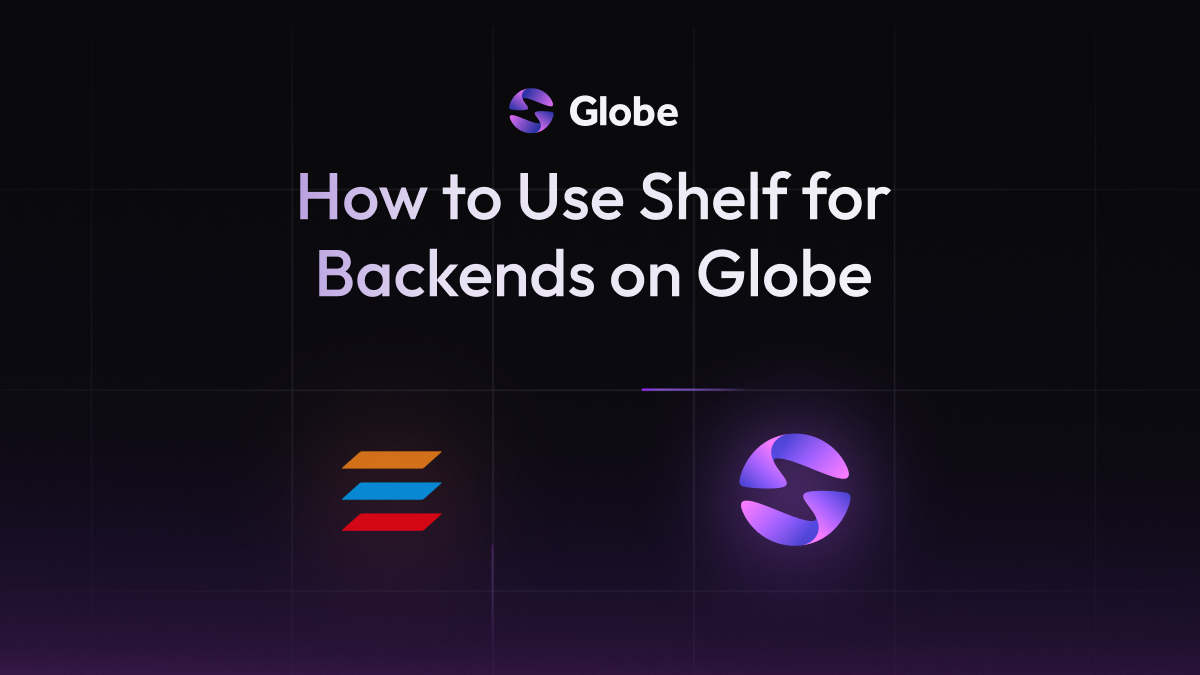How to Use Shelf for Backends on Globe
Create, test, and deploy a Dart backend using the Shelf framework on Globe.

Shelf is a flexible and minimal web server framework for Dart, making it an excellent choice for building APIs. Globe supports deploying Shelf applications with no custom configuration, allowing you to get a server running on a global infrastructure in minutes.
This guide walks through setting up a full CRUD (Create, Read, Update, Delete) API server from scratch and deploying it to Globe.
15 min read
Features Covered
- Creating a Shelf project with routing
- Building a simple in-memory CRUD API
- Listening for Globe's required PORT environment variable
- Deploying to Globe with a single command
Prerequisites
- Dart SDK Installed: If you have Flutter installed, the Dart SDK is already included. If not, Install Dart.
- Globe Account: You'll need an account to deploy projects. Sign up or log in to Globe.
- Globe CLI Installed and Authenticated: Install the CLI by running
dart pub global activate globe_cliand log in usingglobe login.
Step 1: Create a New Dart Project
First, create a standard Dart console application that will serve as the foundation for your Shelf server.
-
In your terminal, run the dart create command:
dart create my-shelf-api cd my-shelf-api
Step 2: Add Dependencies
Next, add the necessary packages to your project: shelf for the server and shelf_router to handle API routes.
-
From your project's root directory, run the following commands:
dart pub add shelf dart pub add shelf_router
Step 3: Write the Server Code
Now, create your server logic with full CRUD endpoints. This code will manage a simple list of repositories in memory.
-
Open your project and create a new file at
bin/server.dart. -
Copy the following code into the file:
import 'dart:io'; import 'dart:convert'; import 'package:shelf/shelf.dart'; import 'package:shelf/shelf_io.dart' as shelf_io; import 'package:shelf_router/shelf_router.dart'; // In-memory data store final _repositories = [ {'id': '1', 'name': 'shelf', 'url': 'https://github.com/dart-lang/shelf'}, {'id': '2', 'name': 'globe_cli', 'url': 'https://github.com/invertase/globe'}, ]; final _headers = {'Content-Type': 'application/json'}; // Configure routes for all CRUD operations final _router = Router() ..get('/repos', _getReposHandler) ..get('/repos/<id>', _getRepoByIdHandler) ..post('/repos', _createRepoHandler) ..put('/repos/<id>', _updateRepoHandler) ..delete('/repos/<id>', _deleteRepoHandler); // READ (all) Response _getReposHandler(Request request) { return Response.ok(jsonEncode(_repositories), headers: _headers); } // READ (one) Response _getRepoByIdHandler(Request request, String id) { final repo = _repositories.firstWhere((repo) => repo['id'] == id, orElse: () => {}); if (repo.isEmpty) { return Response.notFound('Repository not found.'); } return Response.ok(jsonEncode(repo), headers: _headers); } // CREATE Future<Response> _createRepoHandler(Request request) async { final body = await request.readAsString(); final newRepoData = jsonDecode(body) as Map<String, dynamic>; final newId = (_repositories.length + 1).toString(); final newRepo = {'id': newId, ...newRepoData}; _repositories.add(newRepo); return Response(201, body: jsonEncode(newRepo), headers: _headers); } // UPDATE Future<Response> _updateRepoHandler(Request request, String id) async { final repoIndex = _repositories.indexWhere((repo) => repo['id'] == id); if (repoIndex == -1) { return Response.notFound('Repository not found.'); } final body = await request.readAsString(); final updatedData = jsonDecode(body) as Map<String, dynamic>; _repositories[repoIndex] = {'id': id, ...updatedData}; return Response.ok(jsonEncode(_repositories[repoIndex]), headers: _headers); } // DELETE Response _deleteRepoHandler(Request request, String id) { _repositories.removeWhere((repo) => repo['id'] == id); return Response.ok('Repository deleted.'); } void main() async { final handler = const Pipeline().addMiddleware(logRequests()).addHandler(_router.call); // Your app must listen on the PORT environment variable provided by Globe final port = int.tryParse(Platform.environment['PORT'] ?? '8080') ?? 8080; final server = await shelf_io.serve(handler, InternetAddress.anyIPv4, port); print('Serving at http://${server.address.host}:${server.port}'); }
This example uses an in-memory list to store data. This means all data will be lost when the server restarts. For a production application, you would connect to a persistent database.
Step 4: Test Your Server Locally
Run your server locally to ensure all CRUD endpoints work before deploying.
-
Run the server from your terminal:
dart run bin/server.dart -
In a new terminal window, use curl to test the API:
-
List all repositories (GET):
curl http://localhost:8080/repos -
Create a new repository (POST):
curl -X POST -H "Content-Type: application/json" \ -d '{"name": "new_repo", "url": "github.com/user/new_repo"}' \ http://localhost:8080/repos -
Update a repository (PUT):
curl -X PUT -H "Content-Type: application/json" \ -d '{"name": "updated_repo", "url": "github.com/user/updated_repo"}' \ http://localhost:8080/repos/2 -
Delete a repository (DELETE):
curl -X DELETE http://localhost:8080/repos/1
-
Step 5: Deploy to Globe
Finally, deploy your Shelf API to Globe's global network.
-
From your project's root directory, run the deploy command:
globe deploy -
If this is your first time deploying this project, the Globe CLI will guide you through creating and linking a new project on your account. Once complete, you will receive a unique URL for your live API.
By combining Shelf's simplicity with Globe's automated deployments, you can launch efficient Dart backends with ease.
What's Next
- Learn more about Managing Deployments in the Globe dashboard
- Explore the full capabilities of the Globe CLI
- Automate your workflow by setting up GitHub Integration
Couldn't find the guide you need? Talk to us in Discord
